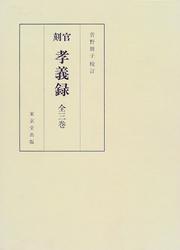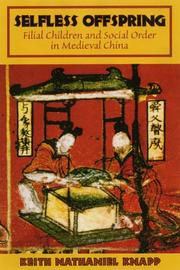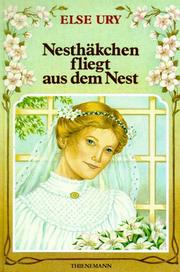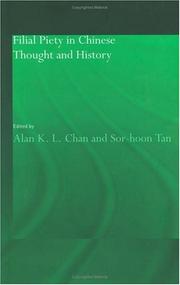| Listing 1 - 10 of 21 | << page >> |
Sort by
|
Book
Year: 1959 Publisher: [Kyoto] : Kyōto Daigaku Fuzoku Toshokan,
Abstract | Keywords | Export | Availability | Bookmark
 Loading...
Loading...Choose an application
- Reference Manager
- EndNote
- RefWorks (Direct export to RefWorks)
Filial piety --- China
Book
ISBN: 9789864042357 9864042351 Year: 2015 Publisher: Xinbei : Hua mu lan wen hua chu ban she,
Abstract | Keywords | Export | Availability | Bookmark
 Loading...
Loading...Choose an application
- Reference Manager
- EndNote
- RefWorks (Direct export to RefWorks)
Ethics --- Ethics. --- Filial piety --- Filial piety. --- Taoist ethics. --- China.
Book
ISBN: 1684176069 0674241177 Year: 2019 Publisher: Cambridge, Massachusetts ; London, England : Harvard University Asia Center,
Abstract | Keywords | Export | Availability | Bookmark
 Loading...
Loading...Choose an application
- Reference Manager
- EndNote
- RefWorks (Direct export to RefWorks)
"Analyzes filial narratives from a wide range of primary texts from late Imperial China, including local gazetteers, biographical records, and fiction, to identify filial piety as the dominant expression of love in Qing texts and show the diversity of acts that constituted exemplary filial piety"--Provided by publisher.
Filial piety --- Filial piety in literature. --- Chinese literature. --- Filial love --- Piety, Filial --- Conduct of life --- Parent and child --- Piety --- History. --- Chinese literature --- China --- History

ISBN: 4490303890 9784490303896 Year: 1999 Publisher: Tokyo : Tokyodo Shuppan,
Abstract | Keywords | Export | Availability | Bookmark
 Loading...
Loading...Choose an application
- Reference Manager
- EndNote
- RefWorks (Direct export to RefWorks)
Denki-Nihon. --- Ethics --- Ethics. --- Filial piety --- Filial piety. --- 1600-1868. --- Japan --- Japan. --- History
Book
ISBN: 9780824882754 Year: 2021 Publisher: Honolulu (Hawaii) : University of Hawaii press,
Abstract | Keywords | Export | Availability | Bookmark
 Loading...
Loading...Choose an application
- Reference Manager
- EndNote
- RefWorks (Direct export to RefWorks)
"Educated men in Song-dynasty China (960-1279) traveled frequently in search of scholarly and bureaucratic success. These extensive periods of physical mobility took them away from their families, homes, and native places for long periods of time, preventing them from fulfilling their most sacred domestic duty: filial piety to their parents. In this deeply grounded work, Ellen Zhang locates the tension between worldly ambition and family duty at the heart of elite social and cultural life. Drawing on more than 2,000 funerary biographies and other official and private writing, Zhang argues that the predicament in which Song literati found themselves diminished neither the importance of filial piety nor the appeal of participating in examinations and government service. On the contrary, the Northern Song witnessed unprecedented literati activity and state involvement in the bolstering of ancient forms of filial performances and the promotion of new ones.
Filial piety --- Filial piety. --- Intellectual life. --- Intellectuals --- Intellectuals. --- History --- To 1644. --- China --- China. --- Intellectual life
Book
ISBN: 9863500003 9789863500001 Year: 2014 Publisher: Taibei : Guo li Taiwan da xue chu ban zhong xin,
Abstract | Keywords | Export | Availability | Bookmark
 Loading...
Loading...Choose an application
- Reference Manager
- EndNote
- RefWorks (Direct export to RefWorks)
Filial piety --- Funeral rites and ceremonies --- History --- China --- Intellectual life

ISBN: 9780824874551 9780824828660 0824828666 0824874552 Year: 2005 Publisher: Honolulu, Hawaii University of Hawaii Press
Abstract | Keywords | Export | Availability | Bookmark
 Loading...
Loading...Choose an application
- Reference Manager
- EndNote
- RefWorks (Direct export to RefWorks)
History --- Confucian ethics. --- Filial piety --- Parent and child --- Confucian ethics

ISBN: 3522170946 9783522170949 Year: 1997 Publisher: Stuttgart : Thienemann,
Abstract | Keywords | Export | Availability | Bookmark
 Loading...
Loading...Choose an application
- Reference Manager
- EndNote
- RefWorks (Direct export to RefWorks)
Duty --- Duty. --- Fathers and daughters --- Fathers and daughters. --- Filial piety --- Filial piety. --- Medical students --- Medical students. --- Tübingen (Germany) --- Germany. --- Germany
Book
ISBN: 1108974473 1108976085 1108968945 1108838359 Year: 2022 Publisher: Cambridge : Cambridge University Press,
Abstract | Keywords | Export | Availability | Bookmark
 Loading...
Loading...Choose an application
- Reference Manager
- EndNote
- RefWorks (Direct export to RefWorks)
In Imperial China, the idea of filial piety not only shaped family relations but was also the official ideology by which Qing China was governed. In State and Family in China, Yue Du examines the relationship between politics and intergenerational family relations in China from the Qing period to 1949, focusing on changes in family law, parent-child relationships, and the changing nature of the Chinese state during this period. This book highlights how the Qing dynasty treated the state-sponsored parent-child hierarchy as the axis around which Chinese family and political power relations were constructed and maintained. It shows how following the fall of the Qing in 1911, reform of filial piety law in the Republic of China became the basis of state-directed family reform, playing a central role in China's transition from empire to nation-state.
Families --- Family policy --- Filial piety --- History. --- Filial love --- Piety, Filial --- Conduct of life --- Parent and child --- Piety --- Families and state --- State and families --- Public welfare --- Social security --- Social policy --- Government policy --- History

ISBN: 0415333652 Year: 2004 Publisher: New York (N.Y.): RoutledgeCurzon
Abstract | Keywords | Export | Availability | Bookmark
 Loading...
Loading...Choose an application
- Reference Manager
- EndNote
- RefWorks (Direct export to RefWorks)
S12/0375 --- S12/0370 --- Filial piety --- -Conduct of life --- Ethics, Practical --- Morals --- Personal conduct --- Ethics --- Philosophical counseling --- Filial love --- Piety, Filial --- Conduct of life --- Parent and child --- Piety --- China: Philosophy and Classics--Filial piety --- China: Philosophy and Classics--Xiaojing 孝經 --- Conduct of life.
| Listing 1 - 10 of 21 | << page >> |
Sort by
|

 Search
Search Feedback
Feedback About UniCat
About UniCat  Help
Help News
News